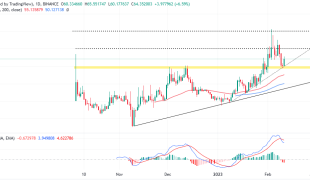Join Our Telegram channel to stay up to date on breaking news coverage
The $60 billion collapse of the Terra ecosystem in May of last year exposed holes in the crypto industry’s structure and set off a year of spiraling financial catastrophes that haven’t stopped since.
Another debate is currently brewing where Terra formerly stood, possibly serving as a red flag for the overall crypto scene.
The issue involves Terra Classic (LUNC), the Cosmos-based network that sprang from the defunct Terra environment, and Allnodes, a significant staking network that is now essential to Terra Classic’s functionality.
In the larger crypto world, Terra Classic is frequently referred to as a “meme chain,” which indicates that it isn’t taken very seriously. Members of the Terra community revived the network more out of an experimental novelty spirit than out of a sincere desire to re-establish the failed behemoth designed by current international wanted man Do Kwon.
Despite its modest outlook, Terra Classic is no laughing matter financially. According to CoinGecko, LUNC regularly clears $100 million in daily trading activity, and its market valuation is now above $1 billion.
Like an expanding number of other blockchains, Terra Classic is a proof-of-stake network. Users that contribute LUNC to Terra Classic’s transaction validation process are rewarded with newly created LUNC as compensation. Additionally, much like with any other proof-of-stake network, anyone unable or unwilling to set up a Terra Classic validator node on their own can pay a third-party service to take care of the complex technical procedure.
Although many of these third parties originally provided support for the thriving Terra staking ecosystem before its demise in May of last year, the majority of significant staking services left as soon as Terra’s reputation became tarnished.
Terra Classic customers were still served by Allnodes, a nodes and staking service situated in Los Angeles, both during and after the network’s demise. The firm now manages staking for almost a third of validators across the whole Terra Classic network. As Terra progressively fought its way back from oblivion, Allnodes rose with it.
In the increasingly centralized world of third-party staking services, the number might not raise eyebrows on its own. However, in light of recent discoveries regarding Allnodes’ treatment of private user data, it has brought to light urgent concerns about how easily staking corporations might possibly take over multibillion-dollar blockchain networks and the absence of measures to stop such mischief.
Allnodes positions itself as a non-custodial service; in the context of cryptocurrency, this often means a business does not manage client private keys or, consequently, have direct access to client funds.
However, Allnodes continues to have all customer operator and validator keys in its possession. In the Cosmos ecosystem, having access to both keys gives anyone access to a validator’s voting power in a network’s governance protocol in addition to the money they receive from staking.
Top core developer for Cosmos, Marko Baricevic, asserts that it is exceedingly unusual for a third party to have such power over client information, especially one that represents itself as non-custodial.
According to Baricevic,
In almost all circumstances, the customer at the very least has the operator key, which controls the funds. In this case, Allnodes is the owner of both keys. That makes it custodial.
Implications of custody
What does that distinction imply? The most significant implication is that Allnodes could use the voting power of the customer nodes it manages for any purpose without the knowledge or consent of its customers. In networks like Terra Classic, it just takes 33.34% of validators to pass any number of governance proposals or to halt all chain activity. Allnodes could hypothetically disrupt the network or pay itself any amount of money via a funding proposal if it had control over at least that proportion of network activity.
Can it then? According to self-reported data that Allnodes has only recently started making public, the company controls between 30% and 31% of Terra Classic’s voting power, falling just short of the threshold that would effectively give it control over the network (as of Friday, Allnodes claims that number has dropped to 29%). The precise percentage, however, could only be confirmed if each and every client of the business came forward. According to Allnodes, customer identities will remain confidential.
Before this week, Allnodes didn’t try to report such information. That policy modification most likely came about as a result of a controversy that the company’s rising influence in the Terra Classic community sparked last month.
A member of the Terra Classic community and the creator of Notional Labs, a Cosmos-based software company and validating service, Jacob Gadikian has been running an active awareness campaign to convince Terra Classic validators to switch from Allnodes for weeks. He wants to lessen the company’s influence on the network.
Hi @Allnodes @MrDiamondhandz1 &c$lunc pic.twitter.com/bIVGSc5J01
— Jacob Gadikian 🐳⚛️⚗️ (@gadikian) January 24, 2023
Gadikian was a part of Terra Classic’s L1 task force, a ragtag group of volunteers that was formed to manage the network’s recovery, until last month. Gadikian left the task force as arguments over Allnodes erupted into hostilities.
After witnessing the actions of @gadikian in the last 24 hours I call for his immediate termination from the L1 task force. He has mocked $LUNC community members by calling them “lowlifes” and “r**ards”, has personally attacked validators and divided the community. We deserve
— Mr. Diamondhandz1💎 (@MrDiamondhandz1) January 24, 2023
According to the developer, Gadikian’s aggressive and ongoing campaign against Allnodes is motivated by his worry that the business’ actions are not an accident but rather a planned strategy.
He asserted: “I don’t think you can develop a corporation to that extent and credibly feel that these are appropriate tactics.”
For its part, Allnodes is confident that it would never cast a ballot on behalf of clients. Konstantin Boyko-Romanovsky, founder and CEO of Allnodes, says that:
If we cast a vote and it becomes public, we are finished. Therefore, it makes no sense for us to vote on behalf of our consumers.
However, Allnodes is essentially holding its own hands behind its back in that regard. There is not much stopping the firm from manipulating its control over client nodes, other from concerns about public reaction.
To make their white label services as easy as possible for customers who don’t want to deal with technical difficulties, Boyko-Romanovsky emphasizes that Allnodes holds customers’ validator keys and operator keys. However, a number of Allnodes’ clients claim they were never informed that they were first handing over the right to critical information.
David Goebelt, a Terra Classic validator and former Allnodes customer, stated,
I honestly didn’t know there were keys with validators. When I began my validator with them, they asked me all the information for my bio and then started up the validator.
Goebelt eventually discovered that the corporation had made and was in possession of his keys. Allnodes finally supplied those keys to Goebelt after several weeks of persistent requests.
Allnodes maintains in advertising and marketing that it is a non-custodial service despite rising scrutiny of its custodial tactics.
“Custody refers to assets and tokens. It does not imply keys,” according to Robert Ellison, the head of growth at Allnodes, who spoke in an interview with the site Decrypt. Ellison claims that the company cannot be regarded as a custodial entity because users’ bank accounts or other wallets are inaccessible to it.
However, the method through which staking incentives are paid out to customers is also under the company’s control. Allnodes is still a crucial middleman in the process of handing out money to clients, even though there haven’t been any claims that it is siphoning any of those payments.
Not your keys => Not your crypto
According to Cosmos lead developer Baricevic:
Actually, it’s not your crypto if it’s not your keys. That was the first tagline. If we look at Celsius or FTX, users believed they were the owners of the funds. The exact same thing is taking place here.
Allnodes acknowledges that there are legitimate concerns about its growing influence over the Terra Classic ecosystem, although maintaining that there are no problems with the company’s internal custodial procedures. But it claims that it actually can’t avoid becoming well-liked.
Allnodes’ Ellison stated, “We don’t want too much voting power.” But ultimately, we have no influence over who delegated to us.
However, the business is raising its Terra Classic staking commissions, which it claims will “deincentivize” users to use their services and weaken Allnodes’ control over the network.
Some people question the sincerity of that initiative.
Juri Maibaum, co-founder of Frens, a different validating service based on Cosmos, advised, “If you want to discontinue providing a service, just do it.” “McDonald’s won’t threaten to raise prices if it decides not to sell hamburgers any more. Simply put, they’re going to quit serving hamburgers.
Unspoken fact: Terra Classic is by far the chain on which Allnodes has the most impact, and Allnodes has a clear financial motive to keep providing its services there. On 68 networks, including Ethereum, Cardano, Polygon, and Solana, Allnodes provides staking services. However, according to self-reporting, it holds less than 10% of the voting power on each of those networks.
Following Gadikian’s awareness effort, a few Terra Classic-based Allnodes customers have discontinued services on moral grounds, but many more consumers may still be ignorant of the problems at hand.
Cosmos: looking for solutions
And a network itself can only do so much, if anything, to resolve such a situation. The creator of the Cosmos blockchain, Baricevic, claims he has been looking for a top-down solution to this kind of issue for months but hasn’t found one. Terra Classic is one of 266 networks and apps built on top of the Cosmos blockchain.
The best course of action, in his opinion, is to adopt a governance proposal requiring all validators on a network to declare their use of third-party services, such as Allnodes. A network could then determine whether it was threatened with dominance by an outside source much more quickly.
However, Baricevic said, “to enforce that, you’re on a witch hunt to find out whether individuals are truly doing it or not.” He doesn’t believe the regulation could be reasonably enforced in the real world.
Even if it were possible, the probability of a hostile network takeover would not be reduced or stopped by such a system; rather, it would simply serve to raise awareness.
The scenario raises unanswered questions that may soon become greater than Terra Classic and even Cosmos, despite the fact that Allnodes’ control over Terra Classic may appear to be an anomaly in the overall crypto scene at the moment.
Over the past year, a number of blockchains have switched to environmentally friendly proof-of-stake models, and with these new architectures, third-party firms like Allnodes (or Coinbase, Binance, and Kraken) have accumulated unprecedented authority over purportedly decentralized power sources.
According to Baricevic,
I think proof of stake as we know it today needs to radically change.
The trustworthiness and dependability of many blockchains will remain dependent on the goodwill and restraint of private corporations, as well as the effectiveness of grassroots awareness campaigns to call those companies out, up until that point.
Related
- Terra Luna Classic Price Prediction – Can LUNC Recover in Q1 2023?
- Terra Luna Price Prediction – Outlook For 2023
- Do Kwon says he takes full responsibility for the collapse of Terra
Join Our Telegram channel to stay up to date on breaking news coverage


